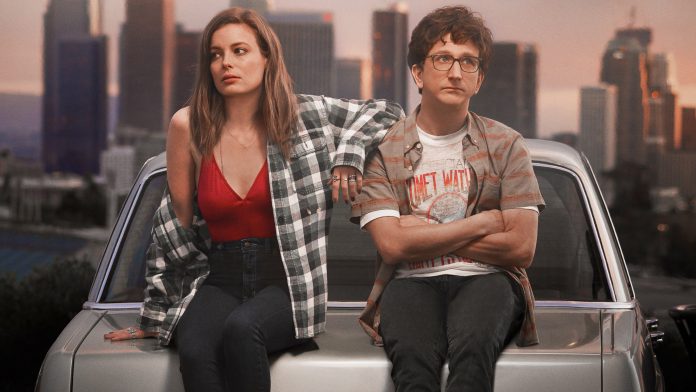Season two of Netflix’s Love is like drinking hard liquor: it doesn’t always taste good, but that isn’t the purpose of it. People drink alcohol for the effect it has on them, the same applies to Love. The main characters are not the typical protagonists; Gus and Mickey are the opposite of their character stereotypes.
Both characters see the other through a stereotype. Mickey sees Gus as a nice guy, and Gus sees her as a cool girl. However, Gus’ inner feelings are deeply cynical and hateful, and Mickey often plays with people’s emotions and is prone to aggressive outbursts. Not only are Gus and Mickey not supposed to be likeable characters, there’s no reason that leads us to think they might work as a couple. But the way Love is comparable to alcohol is that despite having clear red flags, the pair are realistic; and reality sells.
Love isn’t soaring in popularity because people love the traits of the characters, Love is such an engaging show because of its portrayal of a relationship that could be plausible in the real world, which most other shows struggle to do. Rather than attempting to get ratings via events that pull the viewer in by sheer shock value, Love attracts an audience by staying true to itself.
The show has carved itself an identity based on two protagonists that we love to love and hate to hate, and no, not the other way around. Despite their faults, seeds of a budding romance can be seen within their seemingly doomed relationship and as viewers, we want them to work out. However, Gus and Mickey do have faults and at times, they are hateful. But once again, we want them to work out. Hence, we love to love them and hate to hate them.
Between Gus and Mickey, the two are challenged with obstacles in their work lives and personal lives that all come back to the one thing that matters most to them — their relationship. Because of those hurdles that are thrown their way, the worst side of them is brought out and only when that happens do the two get a semblance of what to do and what not to do.
The biggest difference between the first and second seasons of the show is in character development (minor characters included), however limited it may seem. The development we see isn’t much, but it’s still important to character growth. Gus and Mickey mature through a long and arduous process that makes the viewer question, is it worth it? Bertie grows as a character but not so much as a person; her established quirkiness and lovability is shown off more and her tendency to be a pushover is expanded upon in a larger capacity (metaphorically and physically). Chris’ character gets more depth as a person but generally remains the same, and the same goes for Randy.
With the first season being about discovery, the second season was about the consequences of those discoveries that will either eat characters from the inside out or help them grow, and a bit of both happens to Gus and Mickey. Often, TV shows give off this mirage of a desirable life that realistically is a fantasy but with Love, the lives of the people are real; they are supposed to be you. And while that does not seem desirable, we should not be dreaming of living another person’s life. Love teaches us to accept ourselves and others, and to make the most out of our lives, not just our love life. Love is one of the greatest facets of human nature but with it comes so much more, and quite often, more than we ask for or can handle. But that’s life, and executive producer Judd Apatow realizes that from the get go.


